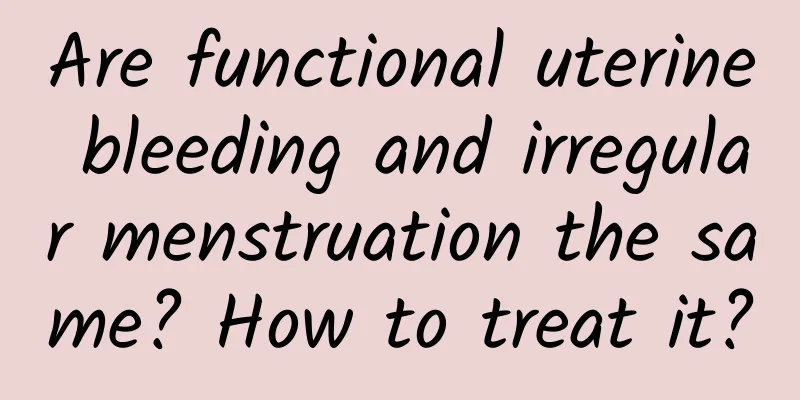Are functional uterine bleeding and irregular menstruation the same? How to treat it?

|
Dysfunctional uterine bleeding and irregular menstruation are not exactly the same. They have different causes and diagnostic criteria, but both are related to abnormal menstrual cycles. Treatment includes medication, surgery, and lifestyle intervention. The specific plan needs to be determined based on the actual situation of the patient. 1) The difference between dysfunctional uterine bleeding and irregular menstruation Dysfunctional Uterine Bleeding (DUB) is a bleeding problem caused by abnormal menstrual cycle and volume without organic lesions (such as uterine fibroids, endometriosis, etc.). Menstrual irregularity is a general term for abnormal menstrual cycle, which may include abnormal menstrual volume (too much or too little), irregular cycle length, and amenorrhea. Simply put, functional uterine bleeding is a type of irregular menstruation, but not all irregular menstruation is functional uterine bleeding. The latter also needs to rule out pregnancy and other organic causes. 2) Common causes of dysfunctional uterine bleeding and irregular menstruation -Genetic factors: Irregular menstruation in many women may be related to family heredity. -Environmental factors: Stress, staying up late for a long time or strenuous exercise can lead to dysfunction of the hypothalamic-pituitary-ovarian axis, which in turn leads to menstrual problems. - Physiological factors: Women in adolescence or perimenopause often experience functional uterine bleeding due to frequent hormone fluctuations. Women of childbearing age are also prone to similar symptoms due to endocrine problems such as polycystic ovary syndrome and thyroid dysfunction. - Traumatic and pathological causes: such as cesarean section scars, uterine fibroids, uterine cavity infection, etc., which can cause abnormal menstruation or uterine dysfunction. In contrast, functional uterine bleeding is characterized by not being accompanied by obvious organic pathology. 3) Treatment methods -Medication: a) For functional uterine bleeding, oral short-acting contraceptives can be used to help regulate hormone levels. b) For those who have lost a lot of blood, hemostatic drugs (such as tranexamic acid) can be used, and iron supplements can be used to prevent anemia. c) If it is caused by endocrine disorders, progesterone supplements or ovulation-inducing drugs can be used under the guidance of a doctor. -Surgical treatment: If drugs are ineffective or an organic cause is suspected, surgical measures should be considered, such as hysteroscopy to remove the lesion; for women with amenorrhea or very little menstrual flow, fallopian tube correction surgery can be used to help restore function if necessary. -Lifestyle intervention: Maintain a regular schedule, reduce mood swings and high-intensity exercise. Increase the intake of iron-containing foods such as animal liver and spinach, and avoid stimulating foods such as coffee and alcohol. Moderate aerobic exercise (such as brisk walking for 30 minutes) every week can help improve the overall endocrine cycle. The difference between functional uterine bleeding and irregular menstruation needs to be clarified after detailed examination. If there is prolonged abnormal bleeding or amenorrhea, you should consult a gynecologist as soon as possible to avoid delaying treatment. For minor symptoms, it is also recommended to start with self-care, including recording the menstrual cycle and monitoring changes to provide a basis for accurate diagnosis. Healthy living habits and timely medical treatment will allow women to better understand their health status. |
<<: Are endometrial polyps uterine cysts?
>>: What causes Bartholinitis in women?
Recommend
What are the causes of cervical warts
Speaking of cervical warts, most people may not k...
NG sports prone to varicose veins 5 tips to wear the right elastic socks
The trend of exercising to lose weight is gaining...
What should patients with adnexitis pay attention to?
What should patients with adnexitis pay attention...
What are the effects of cervical erosion surgery on the body? How should women take care of themselves after cervical erosion surgery?
Cervical erosion is a relatively serious gynecolo...
Common complications of vulvar leukoplakia
If vulvar leukoplakia is not treated in time or t...
[Video version] Potatoes VS sweet potatoes, a big PK in weight loss! The winner is...
Sweet potatoes or potatoes, which one do you pref...
Explain in detail the reasons and methods of checking abortion
Nowadays, people don’t know much about the reason...
The occurrence of female vulvar leukoplakia is caused by many factors.
Women should know about vulvar leukoplakia. After...
What are the causes of vulvar itching?
Vulvar itching is actually caused by many disease...
Patients with ectopic pregnancy must undergo timely examination
Among gynecological diseases, ectopic pregnancy i...
The key to treating amenorrhea caused by mental stress is to regulate menstruation and nourish blood
Ms. Wang is young, just 26 years old, and not mar...
How long does it take for a child's abdominal lymphadenitis to get better?
It usually takes 1 to 4 weeks for children to rec...
What are the harms of abortion to the human body? Eight major harms of abortion that women should pay attention to
Abortion is the abbreviation of artificial aborti...
Eating enzymes is essential for losing weight and detoxifying! You must know the three charms of enzyme craft beer
There is a way to lose weight that does not requi...
What are the causes of ovarian cysts?
Many people are confused about what causes ovaria...









